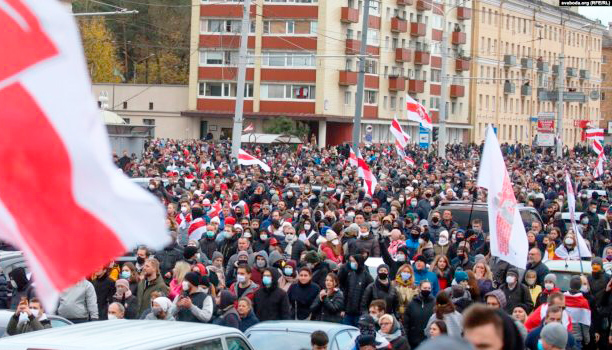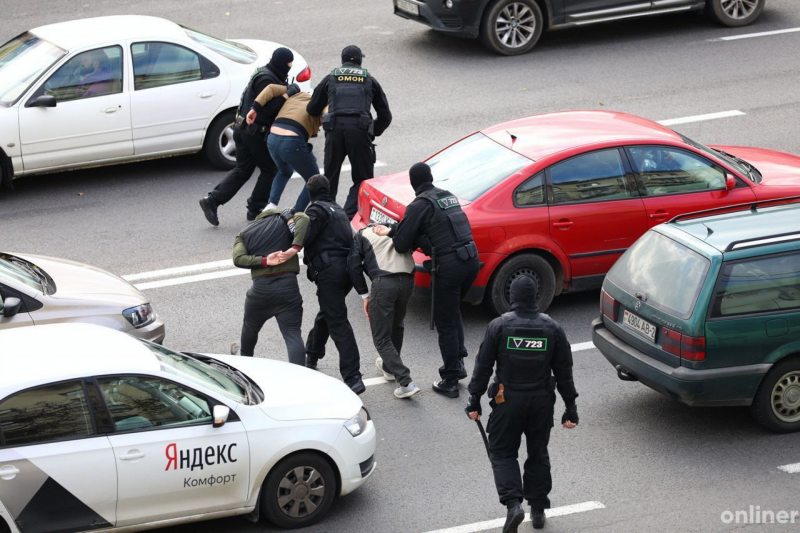"Four years have passed, but I can't forget that march to this day": the story of a Minsk driver
Ales (name changed for the safety of relatives), a truck driver from Minsk, now lives in Klaipeda, where he moved to in February 2022 to avoid persecution. In his new place, he and his friends are trying to unite the diaspora in the city and organize events together. And the story he agreed to share with Viasna happened four years ago in Belarus.
"I noticed how my fingers turned blue from the cable ties around my wrists"
Ales took part in many actions and marches in 2020. Once he got hit by a riot policeman with a baton, but all the time his legs saved him: he managed to run away because he ran well. But one day it did not help…
"It happened in Minsk on October 18, 2020, on Lenin Street. I was walking with my friends and my father. And there, near a long wall, a minibus drove up, and about 10–15 riot policemen ran out of it. They grabbed me and began to beat me, all parts of my body, on my head and legs. They even tore up my jacket.
Then they put cable ties on our wrists and took us to the minibus raising our hands above our heads, and threw us on the floor. Then, for about two hours, the riot police traveled around the city in the minibus, detaining people. There was not enough air inside, and some people fainted. Later, we were all transferred to a large prisoner truck. Then they took us to the police department of the Maskoŭski district. When we were leaving the prisoner truck, riot police beat those who passed them by.
Then everyone was herded into an assembly hall, which was already packed with protesters. Everyone was photographed and fingerprinted there. I noticed how my fingers turned blue from the cable ties around my wrists. After drawing up the reports, many were taken to the Žodzina temporary detention facility," the man says.

- Partisan march in Minsk on October 18, 2020. Photos from social media.
The national flag under our feet and judges from regions
"In Žodzina, riot police threw a white-red-white flag under our feet, and those who stepped over it received a blow. Then they led us through some passages, shouted at us, and drove some of us with batons. The most unpleasant and terrifying thing was the attitude of the temporary detention facility workers towards us. You just couldn't look at them — they used violence for that, and almost all of them were wearing balaclavas. They swore foully and looked at us as at enemies and criminals.
I got into the cell with my father. There were a lot of people there and there weren't enough places for everyone. There were only two two-tier bunk beds for about 15 of us. There were no mattresses there. The window was open all the time in the cell, and it was very cold. The light was on, and periodically the anthem or pro-government songs were played on the radio.
On the second day, the trial took place right in the temporary detention facility. Moreover, there were not enough judges, and so many were from the regions — the case of my friend from the next cell was heard by a judge from the Krupski district, for example.
The report on Ales was drawn up under Part 1 of Article 24.23 of the Administrative Code for violating the procedure for organizing and holding mass events. He was able to read its copy only on October 30.
"The judge asked, 'Are you pleading guilty?' I said that I was not, that I did not agree with the report: we did not shout anything, we did not carry flags, we just passed by."
Then he gave the man time to prepare for the process and postponed the hearing to October 30 in Dziaržynsk. Ales went to the trial with his father. Fortunately, the judge sent the case for revision and said to wait for a new subpoena.

- Arrests at the Partisan March in Minsk on October 18
Ales continued to go to the marches until they stopped and even forgot about the report and the postponed trial. And only a year later the security forces came to his father with a search. Then a search was conducted at the place of residence of Ales, and his relatives were asked where he might be.
"But I had already left Belarus, because I had felt that I would soon be imprisoned. After all, at that time, there were a lot of trials over the participants of the protests in 2020. I was also concerned about the administrative case that was not finished. And my work agreement was not renewed. Then I urgently applied for a work visa and moved to Lithuania. Now four years have passed, but I can't forget that Partisan March to this day.”


















